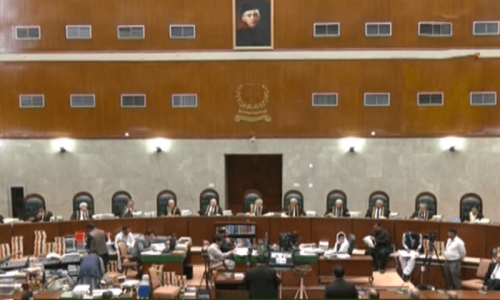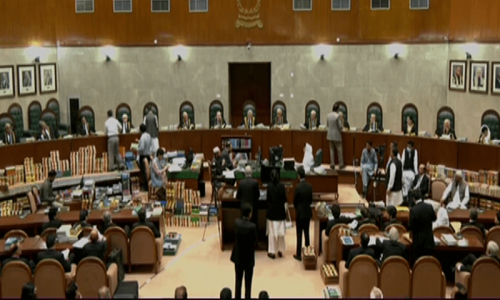ISLAMABAD: Cross-talks, interjections, interpolations and elucidations by judges marked Tuesday’s hearing on challenges to the Supreme Court (Practice and Procedure) Act, 2023, forcing an exasperated chief justice to appeal the fellow bench members to let counsels complete arguments without interruptions.
“We are here to hear the counsel. I lose my chain of thoughts [due to judges queries],” observed CJP Qazi Faez Isa while heading the full court bench consisting of all 15 judges of the Supreme Court.
While pointing towards senior counsel Faisal Siddiqi — who was representing MQM-P — the CJP said this was not a laughing matter. “Though the questions of judges were significant,” the CJP said, “the time of the court belongs to the people who have invested heavily in us.”
Interesting exchange between judges and counsel hints at disquiet among judges over court’s workings
“This is the fourth day we are hearing the case; if we keep on hearing endlessly for a year, this will harm our performance.”
He advised his fellow judges to expound their views through judgements.
But the chief justice was left to face the indifference of his colleagues as some members of the bench kept interjecting during arguments.
As a result, the entire four-hour-long proceedings were consumed by Mr Siddiqi’s arguments, with the Pakistan Bar Council (PBC) vice chairman taking a few minutes to advance his contentions.
At one point, Justice Munib Akhtar observed that as a judge sitting on the bench, he was entitled to ask questions.
‘Absolute power’
During the hearing, Justice Musarrat Hilali regretted that whenever Article 184(3) of the Constitution was invoked by filing petitions before the court, it shook the very foundation of the country. She wondered whether any room was still left for improvement in the court’s functioning, especially when the rules were framed in 1980 while the Constitution was passed in 1973.
“Is the power given to the Supreme Court to make its rules absolute?” Justice Hilali asked.
While concluding his arguments, Mr Siddiqi said except for sections 3 and 4 of the Act, which were intrinsically connected with Section 2, all other provisions have their independent status and even Section 2 can be independently held as valid without reference to sections 3 and 4.
The counsel argued that even if one or more provisions of this Act were struck down as a consequence of this hearing, then on the doctrine of severability, the rest of the provisions could be saved.
The mere fact that no appeal can be filed against an order passed by nine or more judges or the full court would not lead to the conclusion that providing an intra-court appeal (ICA) to orders passed by eight or fewer judges would be unconstitutional, Mr Siddiqi continued.
“Even after the enactment of this law, there is no appeal against orders passed by the court under Article 184(1) and Article 186A, so the absence of appeals in certain cases is not a valid reason for the absence of appeal in other cases.”
A bare reading of Section 5(2) of the Act shows that appeals only lie against orders passed under 184(3) and not against orders under Article 188 (review jurisdiction) arising out of Article 184(3), argued Mr Siddiqi.
Interesting exchange
Similarly, cases in which reviews are pending against orders passed under Article 184(3) would need to be withdrawn if appellate jurisdiction under Section 5 is to be exercised, suggested the counsel.
It was a settled law that when a statute confers a retrospective right or remedy, this right or remedy does not affect closed and past transactions and vested rights.
This led to an interesting conversation, hinting at the discontent among some judges over the court’s working.
Justice Ijazul Ahsan observed that when the parliament makes a law to interfere in the internal workings of the apex court, the insulation provided to the Supreme Court by being empowered to manage its inner workings goes away, and it opens gates for interference.
Besides, no law can be struck down on the grounds of the floodgates argument, but by the exclusion of cases and in view of the very small number of Article 184(3) cases, the dangers of the floodgates argument are substantially reduced, he said.
After the proceedings adjourned, Advocate Uzair Bhandari requested the CJP to include the names of the associates in the attendance sheet. “Only on condition that the lawyer furnishes an affidavit stating his associates have been remunerated appropriately,” said CJP Isa.
As the judges were about to leave Courtroom No 1, Justice Jamal Khan Mandokhel suggested to Advocate Bhandari to file the list and “we will send it to the committee of three judges to decide accordingly”.
At this, CJP remarked that he was no longer the master of the roster — a reference to powers to create benches and fix cases.
“Have you ever seen a sports team winning a match with three captains,” Justice Sayyed Mazahar Ali Akbar Naqvi asked Mr Siddiqi on a lighter note.
Justice Mandokhel replied he was a sportsman and that all teams have vice-captains.“But a team adorns only one captain,” replied Justice Naqvi.
Published in Dawn, October 11th, 2023













































Dear visitor, the comments section is undergoing an overhaul and will return soon.